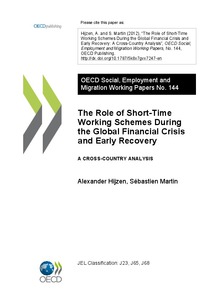The role of short-time working schemes during the global financial crisis and early recovery. A cross-country analysis
"There has been a strong interest in short-time work (STW) schemes during the global financial crisis. Using data for 23 OECD countries for the period 2004 Q1 to 2010 Q4, this paper analyses the quantitative effects of STW programmes on labour market outcomes by exploiting the country and time...
| Main Authors: | , |
|---|---|
| Institution: | ETUI-European Trade Union Institute |
| Format: | TEXT |
| Language: | English |
| Published: |
Paris
2012
OECD |
| Subjects: | |
| Online Access: | https://www.labourline.org/KENTIKA-19120156124919483389-The-role-of-short-time-working.htm |
| _version_ | 1771659902422351872 |
|---|---|
| author | Hijzen, Alexander Martin, Sebastien |
| author_facet | Hijzen, Alexander Martin, Sebastien |
| collection | Library items |
| description | "There has been a strong interest in short-time work (STW) schemes during the global financial crisis. Using data for 23 OECD countries for the period 2004 Q1 to 2010 Q4, this paper analyses the quantitative effects of STW programmes on labour market outcomes by exploiting the country and time variation in STW take-up rates. The analysis takes account of differences in institutional settings across countries that might affect the relationship between labour market outcomes and output and also addresses the endogeneity of STW take-up with respect to labour market conditions. Moreover, special attention is given to the dynamic aspects of the relationship between output and labour market outcomes. The results indicate the STW raises hours flexibility by increasing the output elasticity of working time and helps to preserve jobs in the context of a recession by making employment and unemployment less elastic with respect to output. A key finding is that the timing of STW is crucial. While STW helped preserving a significant number of jobs during the crisis, its continued use during the recovery may have slowed the job-content of the recovery. By the end of 2010, the net effect of STW on employment was negligible or may even have become negative. However, the gross impact of STW on the number of jobs saved per quarter remains large and positive in the majority of countries." |
| format | TEXT |
| geographic | OECD countries |
| id | 19120156124919483389_77673702aa8e4c469165999a759f6d04 |
| institution | ETUI-European Trade Union Institute |
| is_hierarchy_id | 19120156124919483389_77673702aa8e4c469165999a759f6d04 |
| is_hierarchy_title | The role of short-time working schemes during the global financial crisis and early recovery. A cross-country analysis |
| language | English |
| physical | 38 p. Digital |
| publishDate | 2012 |
| publisher | Paris OECD |
| spellingShingle | Hijzen, Alexander Martin, Sebastien economic recession employment security short time working The role of short-time working schemes during the global financial crisis and early recovery. A cross-country analysis |
| thumbnail | https://www.labourline.org/Image_prev.jpg?Archive=111222493940 |
| title | The role of short-time working schemes during the global financial crisis and early recovery. A cross-country analysis |
| topic | economic recession employment security short time working |
| url | https://www.labourline.org/KENTIKA-19120156124919483389-The-role-of-short-time-working.htm |

